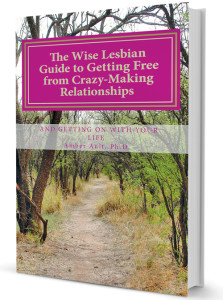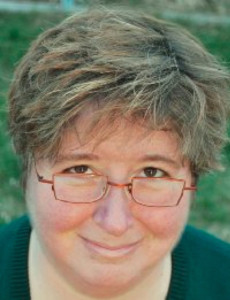
Drama or Exit?

by Amber Ault
2013 • Close the Gaps Cultural Consulting (amazon.com)
222 pages • $15.26
Hardcover
‘The Wise Lesbian Guide to Getting Free from Crazy-Making Relationships’
by Kit van Cleave
Gay women often complain about the amount of drama in their relationships. They say one reason for this is the “married too quick” aspect in many of their early dates. (Here’s a lesbian joke: “What does a lesbian bring on a second date? A U-Haul.” It spoofs the tendency of a lesbian couple to move in together too fast.)
Another reason given for the tempestuousness of women’s relationships is that two women are so much alike that they step on each other’s emotional toes.
Amber Ault, who has a Ph.D in social work, gives some good advice in her book, The Wise Lesbian Guide to Getting Free from Crazy-Making Relationships—And Getting on with Your Life. She was motivated to do so because “. . . lesbian partners in crazy-making relationships often spend a great deal of time and money trying to figure out what could explain their girlfriends’ erratic, exploitive behavior” and how to return harmony and stability to the household.
Ault outlines reasons why unique stresses can affect such couples before any lesbian relationship even starts. “How does living in a heterosexist and homophobic society affect your vulnerability to getting involved with a woman who is a narcissist, a psychopath, or [has] a borderline personality disorder?” She notes problems LGBTQ people have in getting help or learning strategies for protecting themselves and recovering from toxic wars. In short, if both partners are already hyper-stressed, the future for any blossoming relationship looks bleak.
Ault wants lesbians to choose their partners more carefully and build skills to both identify and understand toxic partners and how to respond to them. “Too many women,” she writes, “ find themselves manipulated, exploited, abused, undermined, and exhausted by the intimate partners they trust to serve as sources of sweetness, security, and comfort.”

She gives some basic signposts to look for, including: the capacity to form attachments to a primary partner; a commitment to integrity, trustworthiness, honesty, and respect; the ability to keep agreements and tell the truth; the capacity to self-soothe and stay centered; the ability to prioritize the partner’s interests over your own when circumstances require; and the ability to modulate speech in negotiations. She recounts the stories of women she interviewed about their relationships.
Ault also describes the symptoms of the major “personality disorders”:
• For the narcissist, the game turns on adoration, entitlement, and grandiosity;
• For the borderline personality disorder, the game centers on abandonment and attachment;
• For the sociopath, the game is always about power and punishment.
She also points out that while mental illnesses like depression, bipolarity, anxiety, and schizophrenia often respond to medication therapy (if the patient takes her meds), personality-disordered people often avoid psychotherapy, especially once a therapist has diagnosed them properly. “Personalities are difficult to change,” she notes. Besides, as they tend to be intelligent and are often attractive, women with toxic traits are often rewarded for their behavior by those they hurt, confuse, and ruin. They have been manipulating people all their lives, so they are much better prepared to win control than a partner who has consistently behaved generously and honorably toward others.
Ault is somewhat negative on the demo-
graphics of lesbian life. She infers the percentage of lesbian, gay, and bisexual population in the
U.S. is 3.5 percent, much less than a 10 percent pollsters have bandied about. Thus, in her polls,
the prospective girlfriends available to 15- to 60-year-olds is a small fraction of the tiny percentage she began with. “So the pool of available partners is so restricted that settling for a toxic or problematic partnership looks like a viable option,” she writes.
Secondly, “more lesbians than heterosexual people or gay men over 50 live alone.” Also, “given that many people with personality disorders can be very charming early in a relationship, many lesbians recognize the limits of the dating pool,” so they may not screen partners as long or carefully as they should.
As a final negative note, Ault suggests that due to homophobia, lesbians just haven’t dated very much, so they are really naïve about how relationships work.
Does all of this sound like the ending will not be so good? Yep, and Ault is very clear about it. If your partner is cruel, abusive, vindictive, or just loony, you’re going to have to cut the relationship off. She provides useful tips on how to do that, and how to recover from the various traumas the relationship has inflicted.
Here are a few other red flags from relationships:
Does she
• invite you to lunch or dinner, then not appear, and show up at another restaurant when you call her to see where she is?
• flirt, seduce, even kiss others in front of you in public places?
• refuse to meet your friends, and invite you only when her friends are around?
• run like a rabbit from intimacy?
• dislike or distrust her mother?
• invite you to an event where you have to buy tickets, then cancel on you?
Time to hit the door—and read Ault’s book while cooking dinner for one. Take six months off. Don’t respond to phone calls or e-mails. Rest. See your friends. Don’t talk about the ex. Read. Go to the movies. Try again.
Kit van Cleave is a freelance writer living in Montrose. She has published in local, national, and international media.










